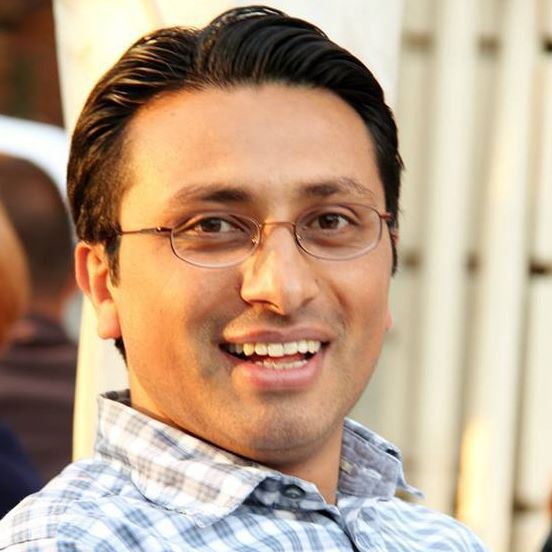 Statement by Hon. Dr. SwarnimWagle, Member, National Planning Commission, and the Leader of Nepalese Delegation to the Ministerial Segment of the 71st Session of UNESCAP Commission.
Statement by Hon. Dr. SwarnimWagle, Member, National Planning Commission, and the Leader of Nepalese Delegation to the Ministerial Segment of the 71st Session of UNESCAP Commission.
“Mr. Chair,
I speak before you today with great sadness. As a result of the twin quakes that hit Nepal on April 25 and May 12, and continued aftershocks, large parts of the country are in ruins. This has caused immense human loss and suffering, and destruction of public assets and private property. More than 8,500 people have perished, and over 21,000 are injured. Over a half a million houses are destroyed or damaged. Most of the classrooms and health posts in the affected districts are beyond repair. Landslides triggered by frequent shaking of the ground beneath — and those imminent over the coming monsoons — will strain an already fragile mountain ecology.
Some of the most precious cultural monuments are irretrievably destroyed. These riches belong not just to Nepal, but to the world as UNESCO heritage sites. The Changu Narayan temple that is about to collapse is more than 1500 years old, and temples and palaces in the Kathmandu Valley and beyond date back to the pre-industrial era. They mark the glory of Nepali civilization in the central Himalayas.
Our Government has declared 14 of the 75 districts as crisis hit, with another 17 affected severely. We have not faced a calamity of this scale for over 80 years. When the last great earthquake hit Nepal in 1934, there was hardly any modern building or road, school or motorized vehicle. Nepal of the 21st century is a progressive nation of nearly 30 million people, who are increasingly educated, politically conscious, and globally connected.
My delegation takes this opportunity to express its sincere appreciation to our neighbors, friendly nations, development partners, international agencies, and global citizens who were generous with their concern, and spontaneous in their support. We are comforted by the assurance that you will be with us through the forthcoming phases of recovery, rehabilitation, and reconstruction as well.
Mr. Chair,
Despite decades of political instability and armed conflict, Nepal was on a firm path to achieving many of its MDGs by the end of this year, including the goal to halve absolute poverty. For the first time this year, in the UN’s triennial review of technical thresholds, Nepal met the required criteria for graduation from its status as a Least Developed Country (LDC), possibly by 2022. It is against these milestones that we accept that the devastation caused by the earthquake upsets our high aspirations for swifter economic progress. It is likely to stall some of Nepal’s impressive gains in the social arena. The macro-economic consequences are also profound.
Furthermore, a disaster of this magnitude not only draws attention to seismic fault lines, but also social fissures, which in Nepal takes form of entrenched vulnerabilities. Tens of thousands of people who had just crossed the poverty line might fall back into absolute poverty. This will worsen inequities. Our goal going forward is to be mindful of the challenges we face, and spare no effort to prepare better. Indeed, we see this crisis as an opportunity to rebuild Nepal differently, soliciting innovative ideas from everyone who has a stake in the country’s future, particularly our young citizens who have displayed promising dynamism and creativity in the aftermath of the great earthquake.
Mr. Chair,
We Nepalis are a resilient people. We will rise from the rubble. We will build back better. Out of this crisis will emerge a stronger nation that is more unified than ever. The National Planning Commission is at present leading a major exercise to prepare a definitive Post Disaster Needs Assessment (PDNA) with the support of friendly countries, major development partners, and international agencies. We see the PDNA as a systematic attempt to take stock of the damage and loss, and our immediate needs ahead. We expect this to provide strategic clarity to efforts aimed at early recovery and rehabilitation. Importantly, the PDNA will shape the contours of the resource envelope we seek in the form of international assistance over the long haul.
Let there be no doubt — the enormity of the challenge we face in Nepal is daunting. We will need to muster all the goodwill and support from within Nepal and from our friends and partners. We invite and welcome the ESCAP Secretariat’s help in our recovery efforts, and to mitigate risks of disasters in the future. We make this request based on our proven history of collaboration and trust.
Mr. Chair, Distinguished Delegates,
Almost all the least developed and landlocked countries in the ESCAP region are beset with problems of slow growth, joblessness, and social exclusion. Past efforts to redress these have gained traction, but remain inadequate. Climate change complicates the challenge further with Himalayan glaciers melting and weather patterns becoming erratic. I agree, therefore, that the proposed theme for this 71th Session of the Commission, calling for a balanced approach to sustainable development is timely and salient. We are confident that ESCAP will continue to be a major force for good in our region.
On behalf of the Nepali delegation, I express again our gratitude to the membership of ESCAP for its sustained goodwill and assistance to my country and our people. And I wish the Secretariat well for all the great work that lie ahead for meaningful accomplishment.
Thank you and Namaste.”

